新概念英语青少版3B_Unit_19
青少版新概念3B unit19
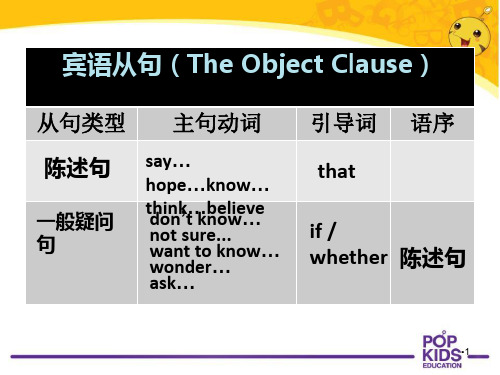
kid time active
think about_________.
It’s like that now. Now is ________.
enough
•12
Listen and underline "used to"
Listen,draw and write
Now let's check.
past
He had a face lift.
past now
Did he use to have long hair?
Yes,he did.
Makes a list of things that are different in your life now compared to when you were a child. clothes (swimsuit, leaves……) school (kindergarten, primary school, middle school) Computers: ( Ipad, Apple computer ) Mobile: (Nokia, Iphone) films pets house (cave) hair styles food favorite things
What's the only difference between home and a vacation?
past
Now
A: What does she look like? B:She used to _______, but now she________.
青少版新概念2BUnit19Aproblemwithsquirrels

ran fast won the race on Saturday
came into class told a joke
one day last week
met a friend in town said hello
one day last month
left home early took Nina to the studio
剪下
Polly:I wanted a squirrel-proof bird feeder,and I haven't got one!
cut--cut put--put take--took give--gave
cut sth down put sth in take sth back to give sth back
Unit 19
A problem with squirrels
Free talk
When did you do yesterday?
Were you happy?
Yesterday I was happy but busy, because it was my mother’s birthday.
Yesterday evening I went to the supermarket and bought a gift for my mother.
Next, I went to the bakery and bought a cake.
Then I brought the gift and the cake back home , I gave the gift to my mother and said “Happy Birthday !”
青少版新概念英语3B单词默写
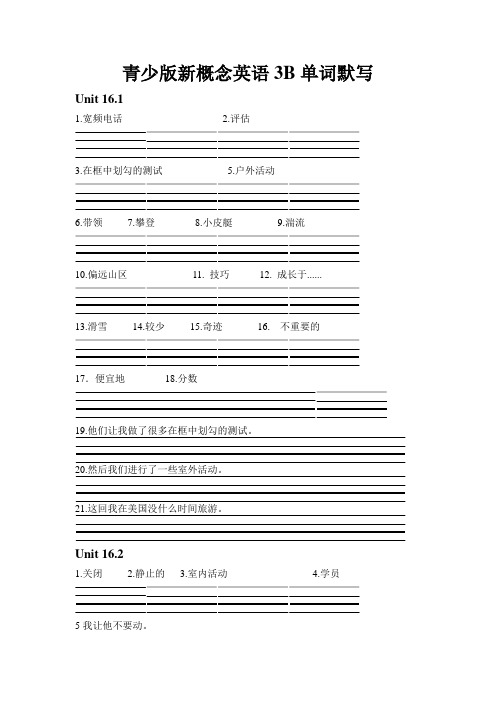
青少版新概念英语3B单词默写Unit 16.11.宽频电话2.评估3.在框中划勾的测试 5.户外活动6.带领7.攀登8.小皮艇9.湍流10.偏远山区11. 技巧12. 成长于......13.滑雪14.较少15.奇迹16. 不重要的17.便宜地18.分数19.他们让我做了很多在框中划勾的测试。
20.然后我们进行了一些室外活动。
21.这回我在美国没什么时间旅游。
Unit 16.21.关闭2.静止的3.室内活动4.学员5我让他不要动。
6.他正准备把所有的钱都花掉,我告诉他要节省钱。
Unit 17.11.打电话2.进展3.度假地4.游泳池5健身房 6.岩石7.森林8. 客人9.保罗说他从未见过这么多漂亮的女人。
10.世界上最奢华的度假地。
11.我想他没有告诉她这些。
Unit 17.21.钱包2.轮胎3.瘪的4.体重增加5罗伯特怎么了?他说他考试没及格。
你是怎么知道的?因为他说的。
6.你的表慢了么?不,我不这么认为。
Unit 18.11.低语2.在楼上3.担心的4.是否5打斗6.你问妈妈我能不能学空手道了么?7.他不知道你会不会同意?8. 他怕你不答应。
9.武术也是有规则要遵守的。
Unit18.21.想知道2.我想知道克莱尔是否找到了工作?你为什么不问她是否找到了呢?Unit19.11.留下2.预定3.习惯做4.游泳池5.活跃的6.来这儿是我妻子的主意。
7.我小的时候经常出去玩。
8.有趣的是,这样休假并没有减轻我的劳累感。
9.我过去也这样认为。
Unit 19.21.流行音乐2.热衷于3.喜欢4.蜘蛛5.他听流行音乐么?他过去听,但是现在不听了。
6.你喜欢游泳么?我过去从不喜欢,但是我现在喜欢。
Unit 20.11.门铃2.回答3.邀请进屋4. 回答5.婚礼6.记录家庭活动的电影7.我刚到家,我的表姐爱丽斯就来按门铃了。
8.我刚把车停在外面。
9.“我4月就要结婚了”。
她说。
10.“恭喜你”。
我答道。
11.不幸的是,恐怕我的确会做的很好。
青少版新概念3B-19单元-Unit19
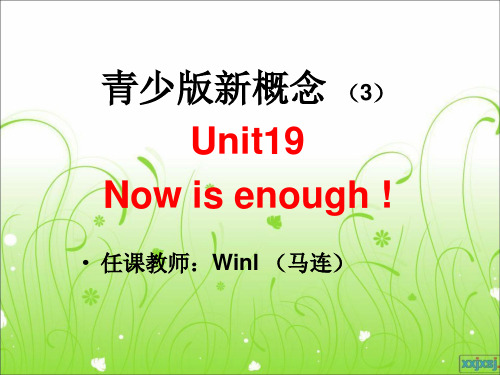
I used to sit by the pool all day, and eat too much dinner every night.
At home, I sit at a desk all day. At night,I sit in front of the TV. Maybe I eat too much dinner.
It's like that now. Now is enough !
It was my life’s idea to come here . She said ,’You need a vacation. Leave it to me ’. So I did . She made all the reservations . It was a big surprise!
Most people think that a vacation is about resting . You feel tired , so you sleep ,you eat ,you sit . You rest . I used to think that ,too .
Most people think ____ a vacation is about resting . You feel tired , so you ___ ,you __, you ___ . You rest . I used to ____ that ,too .
---He doesn't play football,does he? ---No,not now,but he used to when he was younger.
---Does he play football? ---Well,he used to,but he doesn't any more
新概念英语青少版3B_Unit_19
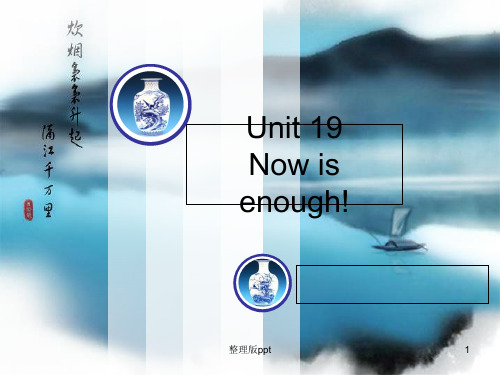
整理版ppt
6
Listening and understanding
1
It was my wife’s idea to come here. She said, ‘You need a vacation. Leave it to me.’ So I did. She made all the reservations. It was a big surprise.
整理版ppt
13
• Don’t worry, leave it to me. • 别担心,有我呢,包在我身上 • Just leave it to me. I'll finish it. • 没问题。一切包在我身上。我会完成的
整理版ppt
14
Listening and understanding
整理版ppt
7
reservation [rezə'veɪʃ(ə)n]
• n. 预约,预订;保留 • reservation service 预约服务
• hotel reservation酒店预订;订旅馆
• make a reservation预定(房间、票)预约
整理版ppt
8
• I’d like to make a reservation. • 我想预约。
A. There; be
B. There; have
C. It; be
D. There; having
整理版ppt
25
• 二、 be used to do something的意思是“被用来做某事”,是动词短 语use ...to do的被动语态结构,used是动词的过去分词(be done 被 动时态)。它可以用各种时态。
新概念青少版2BUnit 19 A problem with squirrels
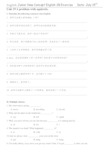
Unit 19 A problem with squirrels.I. Translate the following sentences into English.1. 你昨天在街上看到Mike了吗?_________________________________________________________________________.2. 我昨天因为雨而迟到了,老师让我站在教室外面。
_________________________________________________________________________.3. 外面天气很大风,我们一起去户外玩吧?_________________________________________________________________________?4. 昨天夜里,两个劫匪破门而入我的房间,并且拿走了一些东西。
_________________________________________________________________________.5. 人们砍了太多的树木,很多动物都没有了家。
_________________________________________________________________________.6. Jack,还记得我借给了你一本书吗?你打算什么时候还给我?_________________________________________________________________________?7. 你知道这种小刀的用处吗?我们可以用它来切菜。
_________________________________________________________________________.8. 你昨天晚上睡得好吗?不,我只睡了3小时。
_________________________________________________________________________.9. 别讲话了,老师来了。
新概念青少版_2B_unit_19(共54页)

in my bird feeder, outside my kitchen window.That’s awful! What did you do? I cut it down, and put it in a bag. Then I
met
run say sleep
take
tell
ran said slept took
told
win
won
write wrote
Three little kids slept
together.
go to bed
上床睡觉
Tim 很早地上床睡觉,所以他昨晚 睡得很好。
Tim went to bed early , and he slept well last night.
took it back to the shop.They gave me my money back.But what’s the use of that?I wanted a squirrel-proof bird feeder, and I haven’t got one.
Take it to the shop.
英国小松鼠会"缩骨” 钻 防鼠喂鸟器偷食吃(图)
A squirrel-proof bird feeder.
中新网2月25日电 据英国媒体报道,英 国汉普郡(Hampshire)一家花园中,一 只贪嘴的小松鼠竞能将自己胖呼呼的身 体挤进被铁笼罩着的喂鸟器中偷食吃。
花园主人Sandra Carter 抓拍到。 据Sandra称,近几个月发现灰松鼠经常 “光顾”花园里偷吃给其他动物准备的 坚果,于是就和丈夫花19.95英镑(211 元人民币)买了“防松鼠”的喂鸟器。
青少版新概念2B Unit19 A problem with squirrels
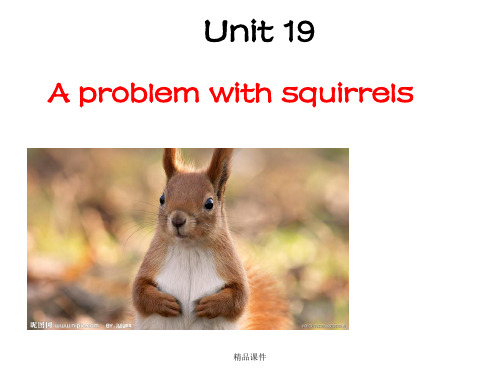
cut down
剪下
精品课件
Polly:I wanted a squirrel-proof bird feeder,and I haven't got one!
cut--cut put--put take--took give--gave
cut sth down put sth in take sth back to give sth back
feeder,Annie?
Annie:Yes,I did. I saw it last week.
see----saw
精品课件
精品课件
Let's learn
Polly:Well,I bought it because of the label. It said.'This bird feeder is “squirrel-proof”.
Unit 19
A problem with squirrels
精品课件
Free talk
When did you do yesterday?
Were you happy?
Yesterday I was happy but busy, because it was my mother’s birthday.
lots of = a lot of 许多, 精品课件
精品课件
Let's learn Polly:That night,a squirrel broke into the 'squirrel-proof' bird feeder. It ate all the nuts. The squirrel's tummy became enormous. Annie:Oh,no! Don't tell me!
青少版新概念英语2B-Unit19-Lesson37-a-problem-with-squirrels教学提纲
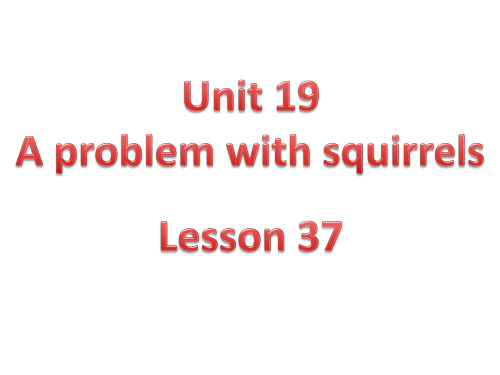
What was the gift?
watch
waterproof
These are waterproof watches.
bird feeder
复合名词
bird feeder
喂鸟器
What’s the use of the bird feeder?
To feed the birds.
squirrel
1.抄Lesson 37 单词 并记住
2.将本课出现的动词, 原形 过去式 抄写4遍
3.听读课文并模仿朗读,并背诵。
lots of = a lot of 许多,
修饰可数和不可数名词
Let's answer
1.Polly put lots of_n_u_t_s_in it. 2.Polly hung it _o_u_ts_i_d_e the
kitchen window.
Let's learn
Polly:That night,a squirrel broke into the 'squirrel-proof' bird feeder. It ate all the nuts. The squirrel's tummy became enormous. Annie:Oh,no! Don't tell me!
nuts
The squirrels like to eat nuts.
Polly bought a bird feeder last week.
label
It’s a squirrelproof bird feeder.
The squirrel broke into the bird feeder. Guess! What happened then …
青少版新概念Unit19
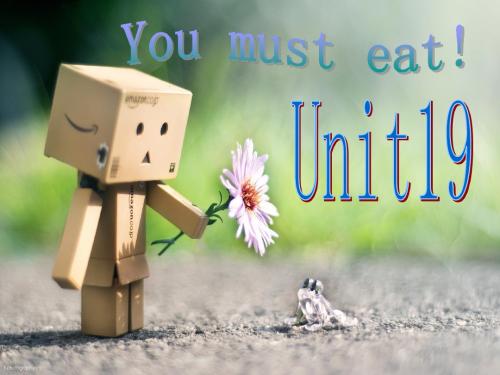
beef 牛肉 pork 猪肉 chicken 鸡肉 mutton羊肉
A: Is there any fish? 有鱼吗? B: Yes, there is , but there isn’t any meat. 是的,有,但是没有肉。
A: Are there any peaches? 有桃子吗?
Who can eat lots of peaches? Nina. Is Daisy hungry? Yes, she is.
Is there any food on the table?
Yes there is. Can Nina look at the food? Yes, she can. Is Nina beautiful?
尼娜:我也饿OK. 黛西:好吧。 Thank you, Nina. 谢谢你,尼娜。 We can finish now.
我们现在可以结束了
on There’s some food the table over there. 那边的桌子上有些食物。
Let’s eat.
Who's this in the picture?Oh, yes, it's Nina. Can you remember Nina?She's that beautiful girl in Daisy's photographs.Look at her. She's tall and thin, with long hair. She's lovely, isn't she? Her hands are long and elegant. And just look at that blouse and skirt! What an expensive outfit! And what an expensive kitchen! Let me see. Yes, there's a new washing-machine in the kitchen. Very nice! And there's a fine cooker, and a fridge. Lucky Nina! What a lovely kitchen! What's in the cupboard? I can see two bottles of water. There are some jars, too, sugar...coffee...rice...Hmm...There is some coffee in the coffee jar. But the sugar jar and the rice jar are both empty! There are some plates in the cupboard, and there's a plate on the table and a bowl as well. But they're empty! I can't believe this! It's a beautiful kitchen, but there isn't any food in it! The fridge is empty!So what's the matter with Nina? She isn't happy, is she? Poor Nina! She's very sad. Tell me about Nina. Is she ill? Poor Nina! She's just hungry.
青少版新概念英语2B Unit19 Lesson37 a problem with squirrels课件
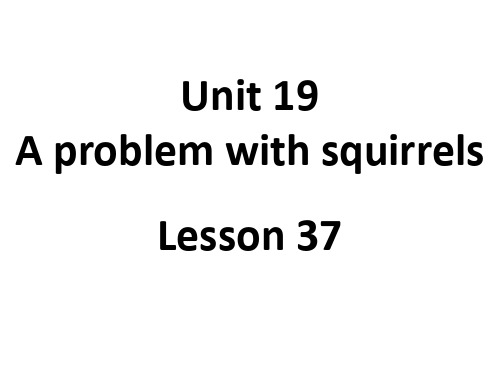
Do you know what was the gift?
watch
waterproof
These are waterproof
bird feeder
复合名词
bird feeder
喂鸟器
What’s the use of the bird feeder?
To feed the birds.
lots of = a lot of 许多,
修饰可数和不可数名词
Let's answer
1.Polly put lots of_n_u_t_s_in it. 2.Polly hung it _o_u_ts_i_d_e the
kitchen window.
Let's learn
Polly:That night,a squirrel broke into the 'squirrel-proof' bird feeder. It ate all the nuts. The squirrel's tummy became enormous. Annie:Oh,no! Don't tell me!
Let's learn
Annie:Yes,you told me that. Polly:Well,I brought it home.
I put lots of nuts in it. And I hung it outside the kitchen window.
tell---told 告诉 bring---brought 带来 put---put 放起,收起 hang---hung /hæŋ/ /hʌŋ/挂起,悬挂
enormous.
新概念英语第三册Lesson19课件_PPT

5. be home 回家
home adv. strike home 击中要害 hit the nail on its head 一针见血 drive home: to make sb. understood讲清楚 home free 大获成功 e.g.: The whole project is now home free.
be dear to sb. 对….来说珍贵 (注:dear:expensive and lovely ,那文章中到底指的是expensive 还是 lovely,这样就形成了双关语)
*双关语(pun):不同词源在长期演化过程中,碰巧变得形式相同,意 义相同,于是形成特有的pun,产生无穷无尽的humor,但译成汉语很难同 时保留原有的幽默感。比如汉语“外甥打灯——照旧”英文中译不出。
b). …the letter had made that quite clear … 做插入语 “that” refers to : “If she didn’t pay a ransom, she would never see the cat again.”
9. follow one’s instructions 听从某人的指示
整个工程告捷。 home page home crowd 家乡父老,家乡观众
青少版新概念Unit19课件
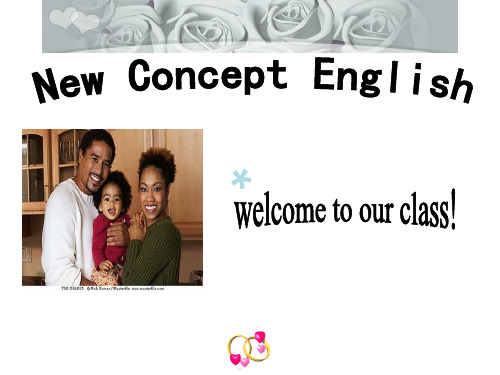
I can ride a bicycle. It’s easy. Yes, I can.
我不能骑自行车,它很难。
I can’t ride a bicycle. It’s difficult. No, I can’t.
some any a lot of
some 1、用在可数和不可数名词,复数 名词前,意为“一些” 2、用在带句号的句子中
Is there a child in the park?
复数句型结构 Are there any+可数名词复数--- ? 肯定结构:Yes, there are. 否定结构:No, there aren’t.
There are some children in the park. Are there any children in the park?
eat 吃
fish 鱼
finish 完成,结束 salad 沙拉
Why? 为什么? dish 菜肴
Why not?为什么不? drink
喝
tired 疲惫的
mustn’t 不能
problem 问题
peach 桃子
lots of 很多 Help yourself! 请自便吧!
Pronunciation
hungry living-room interesting bring ding-dong things English
New Words and Expressions
meat grape buy bread cake tin cheese butter
肉 葡萄 买
面包 蛋糕 金属盒 奶酪 黄油
3 A: Can you see any meat in the window?
青少版新概念英语2B-Unit19-Lesson37-a-problem-with-squirrels学习资料
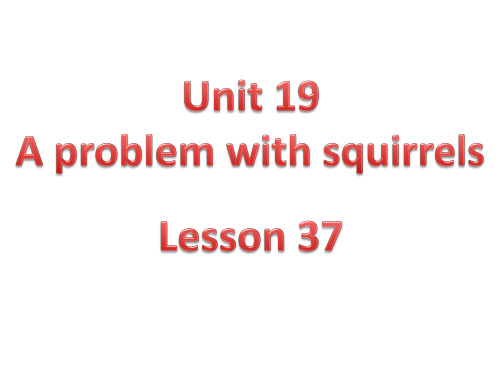
because+句子。 because of+短语。
Let's answer 1.I bought it _b_e_c_au_s_e_o_f__ the
label.
2.This bird feeder is _sq_u_i_rr_e_l-_p_r_oo_f_.
sit put go
sell drive ride come have
sat put went
sold drove rode came had
Revision of lesson 36
Free talk
What did you do yesterday?
Were you happy?
Yesterday I was happy but busy, because it was my mother’s birthday.
lots of = a lot of 许多,
修饰可数和不可数名词
Let's answer
1.Polly put lots of_n_u_t_s_in it. 2.Polly hung it _o_u_ts_i_d_e the
kitchen window.
Let's learn
Polly:That night,a squirrel broke into the 'squirrel-proof' bird feeder. It ate all the nuts. The squirrel's tummy became enormous. Annie:Oh,no! Don't tell me!
Polly:I wanted a squirrel-proof bird feeder,and I haven't got one!
Unit 19 Lesson 37(课件)- 新概念英语青少版2B

more
break more
hang break
more
outside hang break more
cut down outside
hang break
more
use cut down
outside hang break more
nut use
cut down outside
hang break
A problem with squirrels Unit 19 Lesson 37
Free talk
What do you know about squirrels?
Something about squirrels.
Species(种类) : More than 200
Food:
Nuts (mainly)
Watch Video!
Answer!
What did Polly take back to the shop ? Why? The bird feeder. lt didn't work.
Listening and understanding!
bird feeder [bɜːd 'fiːdə] n.喂鸟器 Did you see my new bird feeder, Annie?
break [breɪk] v.打破,弄坏,闯入 The squirrel’s tummy became enormous.
tummy [‘tʌmi] n.(非正式)肚子 Oh, no! Don’t tell me!
Listening and understanding!
The next day, I went into the kitchen. What did I see? A dead squirrel in my bird feeder,
- 1、下载文档前请自行甄别文档内容的完整性,平台不提供额外的编辑、内容补充、找答案等附加服务。
- 2、"仅部分预览"的文档,不可在线预览部分如存在完整性等问题,可反馈申请退款(可完整预览的文档不适用该条件!)。
- 3、如文档侵犯您的权益,请联系客服反馈,我们会尽快为您处理(人工客服工作时间:9:00-18:30)。
• take a message 捎口信,带口信
• Can I take a message? • 我可以帮你留个信息吗? • She’s not in at the moment. Can I take a message? • 抱歉,她现在不在,我能帮你带口信吗?
• • • •
Don’t worry, leave it to me. 别担心,有我呢,包在我身上 Just leave it to me. I'll finish it. 没问题。一切包在我身上。我会完成的
Listening and understanding
4
At home, I sit at a desk all day. At night, I sit in front of the TV. Maybe I eat too much dinner. So what’s the difference? The only difference is the place.
• sit at 坐在…旁边 • sit at the table 围桌而坐
• What's the difference ?有什么不同/区别/
• • • • • what's the problem?有什么问题? what's the result? 结果是什么呢 What's the plan? 什么计划? What's the matter? 怎么了? What's the price ?什么价格
be keen on
Words and expressions
be fond of
be one’s favorite somebody likes enjoy prefer to do
Words and expressions
without reservation 毫无保留
I agree with you without reservation. • 我毫无保留地同意你的意见.
reserve [rɪ'zɜːv]
• vt. 预约 • I'll reserve a table for five • 我要预订一个5人的餐位。
Listening and understanding
1
It was my wife’s idea to come here. She said, ‘You need a vacation. Leave it to me.’ So I did. She made all the reservations. It was a big surprise.
Listening and understanding
2
Most people think that a vacation is about resting. You feel tired, so you sleep, you eat, you sit. You rest. I used to think that, too.
Pronunciation
his shoes he’s the
this chance this thing
it was Jake
ADD YOUR TITLE
Words and expressions
pop music
Do you know who she is?
Words and expressions
• 二、 be used to do something的意思是“被用来做某事”,是动词短 语use ...to do的被动语态结构,used是动词的过去分词(be done 被 动时态)。它可以用各种时态。 • 例如:Knives are used to cut things.小刀是用来切东西的。
Listening and understanding
3
I used to sit by the pool all day, and eat too much dinner every night. The funny thing is, on a vacation like that, I didn’t get less tired.
• tired [taɪəd] adj. 疲倦的;厌倦的,厌烦的 • If you are tired, you feel that you want to rest or sleep. 疲倦的
• Before I start to record something, I want to tell all of you that English is a language , never be tired of it. And if you put your Heart into it , you will get what you want.
• 2 My mother _____ us stories when we were children. A. was used to tell B. is used to telling C. used to tell D. used to telling
• 3 _______ used to______ an old bookshelf in my room. A. There; be B. There; have C. It; be D. There; having
used to
• 一、used to do (sth)
• used to是一个固定结构,它的意思是“过 去经常(做某事)、过去曾经”,它的后 面用动词原形,它表示过去存在某种状态 或者过去的某种经常性、习惯性的行为或 者动作,并意味着这种动作目前已经不存 在,所以它只能用一般过去时,不能用现 在时态。
• 它的陈述句的肯定形式:主语+used to+ 动词原形。 • 例如 I used to play with my friends after school. • 过去放学后我常常和朋友们一起玩。
• 它的否定形式:主语+didn’t+use to+动 词原形。 • 例如: • You didn’t use to like pop songs. • 你过去常常不喜欢流行歌曲。
leave
• vt. 离开;留下;遗忘;委托 • leave me alone 走开,别管我;不要打扰我 ; 让我一个人呆会儿 • leave a message 留言,留口信 • If someone call me when I am out,please leave a message for me. • 我出去时,会有人来电话,请替我留言。
think about • 想,思考,考虑 • Don't think about it any more. • 不要再去想这事了。
• Think about it .想一想。考虑一下。
• think over 仔细考虑
• she needs time to think it over. 她需要时间仔细考虑它。
• 在我开始录音之前,我想告诉在座的大家 ,英语是一门语言,绝不要厌恶它,如果 你全身心的去体会,终将有所收获。
• get tired of sth /doing sth厌烦;对…感到厌 倦 • • • • You never get tired of hearing this story. 这个故事百听不厌。 You never get tired of reading this book. 这部书百读不厌
• by 以…方式 by bike /car/bus/air • 在…旁边 Tom was sitting in a rocking chair by the window. • Tom坐在窗边的摇椅上。 • 在…之前 • By eight o'clock he had arrived at my hotel.
• 他八点前已到了我住的旅馆。
• • • • • • •
too much 太多,修饰不可数 too many 太多,修饰可数 We have too much homework to do. There are too many books on the desk. much too 表示“太 ”修饰形容词副词 The box is much too heavy . The watch is much too dear .
•
• 三、 be used to doing something的意思是“习惯于做某事”,to的 后面用动名词,它可以用现在、过去和将来等时态,be可以用get、 become连系动词代替。 • 例如:My father is used to living in the village. 我爸爸习惯于 住在小山村。
• 3. 它的一般疑问句形式:Did+主语+use to+动词原形+其他? • 例如: • Did your sister use to be quiet? 你的妹妹 过去常常是很安静吗?
• He always used to be late for class. • 他过去常常上课迟到。 • used to可以用在there be结构中表示“过 去经常有”的意思。 • 例如: • There used to be a lot of fishes in this river. 过去这条小河常常有许多鱼。
Listening and understanding
6
It’s like that now. Now s enough!
Words and expressions
leave something to somebody
Guided Conversation
1. Where did you go for your last vacation? When was that? 2. Did you use to sleep a lot when you were a baby? What else did you use to do? 3. What games did you use to play when you were young?
